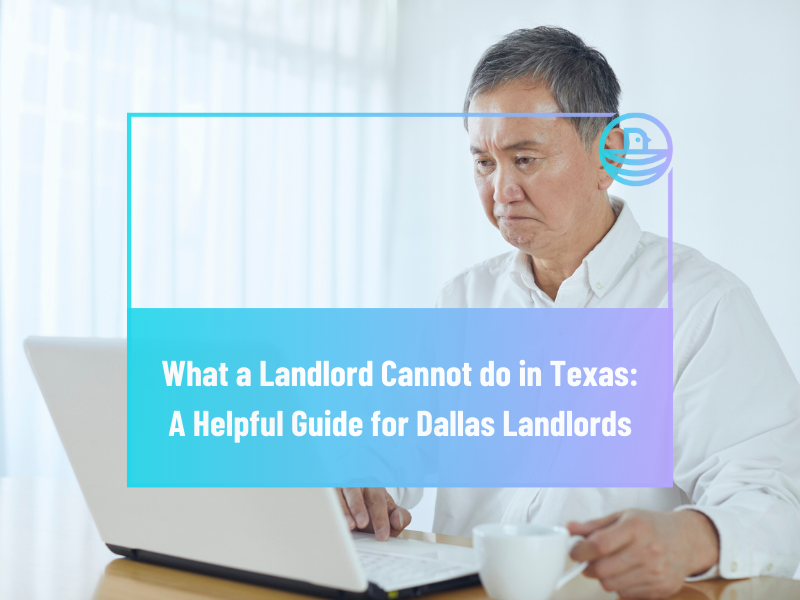Being a landlord in Dallas can be a rewarding way to build income, but it comes with legal responsibilities. Texas has some of the most landlord-friendly laws in the country, but that doesn’t mean anything goes. In fact, what a landlord cannot do in Texas is clearly outlined in landlord-tenant law. Failing to follow these rules can lead to tenant disputes along with other serious consequences like lawsuits, court fees, or even the loss of your rental license.
Whether you own one rental property or several, this guide will explain what a landlord cannot do in Texas and explore how a Dallas property management company can help you stay compliant.
Tenant Rights Every Dallas Landlord Must Respect
.png)
Every rental agreement in Texas is governed by the Texas Property Code, which outlines the rights of both landlords and tenants. While the laws tend to favor landlords, they also put boundaries in place to ensure renters are treated fairly. Failing to understand what a landlord cannot do in Texas can get you in trouble, even if you make an unintentional mistake.
Local courts expect landlords to know these laws and usually won’t excuse a violation if you claim a lack of knowledge. This is one reason many property owners choose to work with a Dallas property management company, as they ensure legal compliance.
What a Landlord Cannot Do in Texas
Knowing the specifics of the landlord-tenant law can help you avoid common pitfalls and maintain positive relationships with your renters. Here’s what a landlord cannot do in Texas:
1. Discriminate Against Tenants
Under both federal and Texas fair housing laws, it’s illegal to treat renters differently based on certain characteristics. These include:
Race or color
Sex
Disability
Familial Status (single vs. parents)
National Origin
Religion
You cannot refuse to rent to someone just because they have kids, own a service animal, or practice a certain religion. You also aren’t allowed to post listings that say things like “perfect for singles” or “no children allowed.”
To avoid accidental discrimination in one of America's most diverse cities, use the same screening process for every applicant. A Dallas property management company will use a fair, legal resident screening process including credit, background, and income checks.
2. Retaliate Against Tenants
Tenants have the right to request repairs, report code violations, and file complaints about unsafe or unfair conditions without fear of retaliation. Here are some examples of what retaliation might look like:
Refusing to make repairs as punishment after the tenant reports a safety concern
Banning the tenant from having guests over after they file a complaint
Refusing to accept rent payments to build a case for eviction after they request a repair
Harassing the tenant with frequent inspections after a disagreement
Towing the tenant’s car without proper notice after they raise a concern
Even actions that seem small or indirect can be considered retaliation if the timing or intent suggests the tenant is being punished.
3. Enter a Rental Without Proper Notice
While Texas law doesn’t set a specific amount of notice you have to give before entering a rental unit, tenants still have a legal right to their privacy. Most Dallas landlords follow the 24-hour rule, giving tenants time to prepare for inspections, maintenance, or showings.
Entering without notice—unless it’s an emergency like a fire or gas leak—can violate a tenant’s right to peaceful and “quiet enjoyment” of the property. Scheduling visits ahead of time shows respect and keeps communication clear. Many leases include entry guidelines to avoid confusion and conflict.
4. Change Locks, Shut Off Utilities, or Remove Belongings
If a tenant stops paying rent or breaks the lease, landlords cannot take matters into their own hands. Landlords can never:
Permanently lock out a tenant by changing the locks
Deny access to a key
Shut off water, electricity, or gas
Remove the tenant’s belongings
Harass or intimidate the tenant
These “self-help evictions” can come with costly consequences. However, temporary lockouts are allowed under these very specific conditions:
The lease must include notice of this right
Rent must be late
The landlord must give written notice of the lock change
A 24-hour number must be provided to pick up a key
The tenant must still have access, even if they haven’t paid
No one can be inside the unit during the lock change.
Temporary lockouts are meant to encourage communication, not replace the formal eviction process. Breaking any of these rules could result in fines and lawsuits.
5. Withhold Security Deposits Without Cause
Texas law requires landlords to return a tenant’s security deposit within 30 days of move-out. Deductions made to cover “substantial” damage, unpaid rent, or cleaning must be explained in writing, along with receipts or documentation. Here’s what a landlord cannot do in Texas with deposits:
Keep the deposit because they’re unhappy with the tenant
Deduct for normal wear and tear (like worn carpet, bubbling paint, or dusty fixtures)
Miss the 30-day deadline without warning or explanation
Mishandling security deposits is one of the reasons landlords in Dallas get taken to small claims court. Dallas property management companies track your finances closely so that you can avoid the expense and stress of court.
6. Evict Without Proper Legal Process
Evictions in Dallas are common, with judges ruling in favor of landlords about 72% of the time. As confident as you may be, you can’t remove a tenant simply by telling them to leave or taking away access to the unit. Instead, you must go through the court system. Legal reasons for eviction include:
Nonpayment of rent
Lease violations
Staying past the lease end date
Criminal activity in the unit
The legal process for eviction includes:
Giving a written “Notice to Vacate” or “Demand for Possession” (at least three days before filing for eviction). It must include the names of everyone being asked to leave and the reason for eviction.
Filing a “sworn petition” in the Justice of the Peace Court where the unit is located.
Attending a hearing.
Receiving a judgment.
Tenants have five days to fight back in court if the Notice to Vacate wasn’t delivered properly (in person, mailed, or attached to the front door), the eviction appears discriminatory or retaliatory, the unit was inhabitable, or the landlord accepted rent payment after starting the eviction. Dallas property managers handle paperwork, timelines, and court procedures on your behalf, ensuring each step is followed to the tee.
7. Ignore Health & Safety Standards
Even in a landlord-friendly state like Texas, landlords are responsible for keeping rental properties safe and habitable. Under the Texas Property Code, you’re required to fix:
Broken locks, windows, or doors
HVAC issues (especially during hot Dallas summers)
Plumbing and electrical problems
Mold, water damage, or pest infestations
Tenants can subtract the cost of repairs from rent or end the lease early if you fail to act. Repeated health or safety violations can also lead to city citations or complaints. Dallas property management companies handle repairs and maintenance quickly to keep you compliant with local regulations.
How Dallas Landlords Can Stay Compliant
To avoid lawsuits and tenant disputes, it’s essential to focus on compliance by:
Creating a lease that aligns with Texas law
Keeping detailed records of payments, notices, and repairs
Following notice rules for inspections, repairs, and evictions
Responding to tenant concerns quickly and professionally
Consider hiring a property manager for help with tenant screening, accounting, maintenance, and legal compliance. If you have legal questions or concerns, consult with a real estate attorney for guidance.
Wrapping Up: What a Landlord Cannot Do in Texas
In Austin, landlords cannot discriminate, retaliate, enter without notice, lock tenants out illegally, withhold deposits without cause, ignore repairs and safety issues, or skip the eviction process. Understanding what a landlord cannot do in Texas will help your rental business thrive, keep your tenants happy, and help you avoid court.
A trusted Dallas property management company like Evernest can handle the legal details so you don’t have to. Contact us today to learn how we can protect your investment and keep your income flowing.


